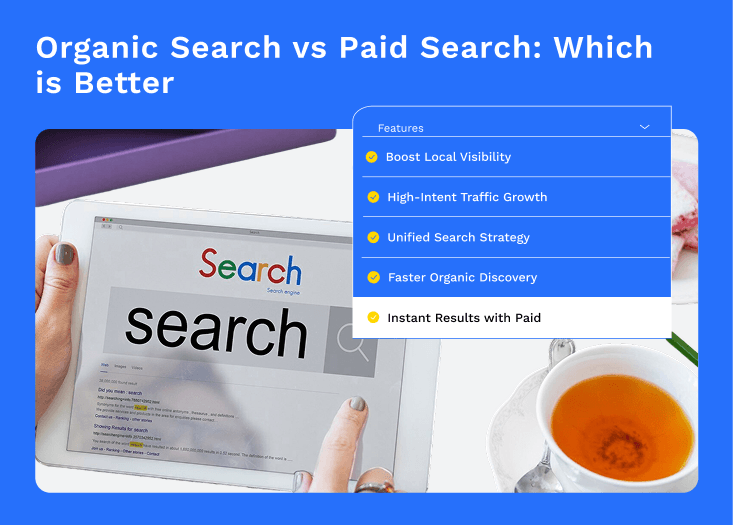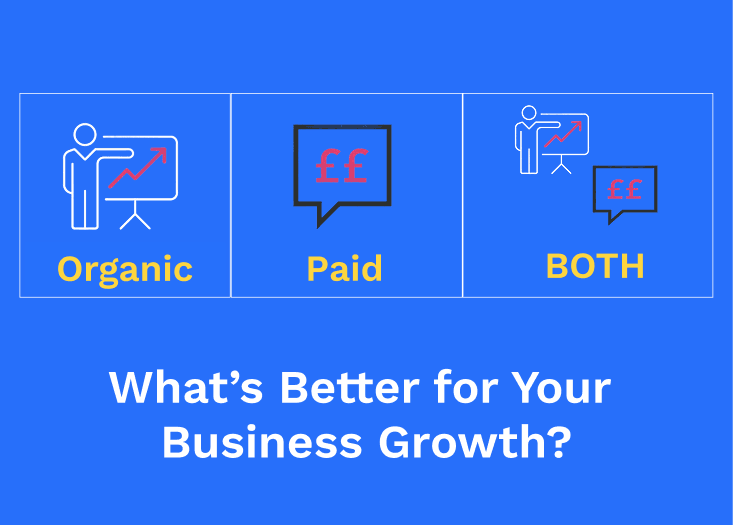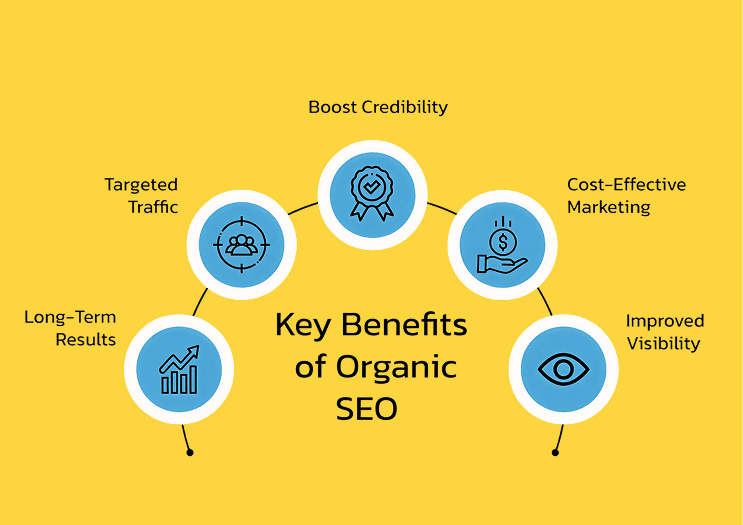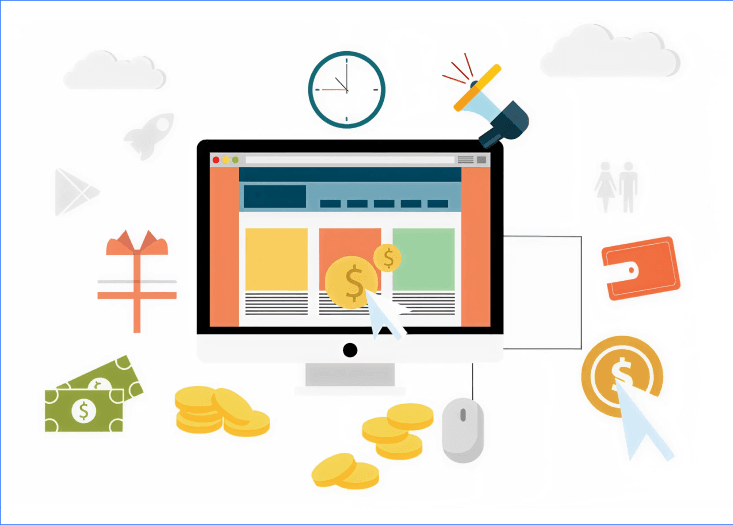Organic vs Paid
Organic Search vs Paid Search: Which is Better in 2025?
Tue, 09 Apr 2024 12:35:02 GMT
Speak to our Hyperlocal Expert

Editor’s Note: This post was originally published in April 2024 and was updated in Nov 2025 for accuracy and comprehensiveness.
Organic search vs paid search is a comparison of two SEO methods. Organic search is unpaid SEO for higher ranking in SERPs, While paid search involves paying for ads in SERPs. Organic requires SEO knowledge, paid search is cost-effective for immediate visibility. This makes organic and paid search an essential part of every brand’s digital strategy.
Organic and paid search are two different methods of optimising a website for search engine visibility. Organic search involves optimising a website through various techniques, such as keyword research and content creation, to rank higher in search engine results pages (SERPs) without paying for advertisement placement. Paid search, on the other hand, involves paying for advertisement placement in SERPs to achieve immediate visibility. Both methods have their own advantages and disadvantages, and choosing the right approach depends on a company's goals and resources.
Organic and paid search results are what lead potential customers to your website. Traffic comes from many sources, and Paid and organic search are two of the most powerful sources your business can use. Knowing the difference between organic search vs paid, as well as their benefits and how to apply them to your business, is crucial if you have an online presence. In this blog, we will explore the differences between organic search vs paid search, and provide insights on how to make the best use of each method.
Watching a video is a great way to better understand the differences between organic and paid search.
What is Paid and Organic search
- Paid Search
Paid search results are adverts that businesses pay for to rise above the organic results as quickly as possible. According to paid search, you only pay if someone clicks on your ad. Paid searches are used by companies to increase their website's ranking on the first page of search results when people use specific keywords to look for their products. In paid results, the “Ad” label appears on the left-hand side of the URL and usually appears first on the page.

- Organic Search
Organic search results are the natural results found in the SERPs beneath the advertising. Its results in web search engines are query results that are calculated strictly algorithmically and are unaffected by advertiser payments. The algorithm decides which websites contain the most useful information based on your search, so they rank highly for the keywords you typed in your query. Implementing an effective strategy for your business is not only a smart idea, it is essential.

For businesses to reach their target audience, two important methods are paid and organic search. Paid search enables businesses to place their ads in the search results pages, while organic search lets businesses rank their website pages for relevant keywords. Although both methods have their pros and cons, the optimal approach for a business will depend on its particular objectives and budget.
Nevertheless, businesses can expand their reach and improve their likelihood of converting visitors into customers by utilising a blend of paid organic and paid search, especially when targeting high-intent local audiences. A balanced organic search vs paid search strategy supported by platforms like Sekel Tech can deliver stronger visibility and scalable results. This combination is one of the most effective ways to compete in today’s digital landscape where organic search vs paid decisions directly impact long-term growth.
For a quick visual explanation, here’s a helpful video that breaks down Organic Discovery in a simple, easy-to-understand way. "Organic Discovery Understanding"
Key Differences Between Organic Search Vs Paid Search
Here is a table showing the difference between Organic Search Vs Paid Search
Basis | Organic Search | Paid Search |
Placement | Middle of the page | Top of the page |
Ranking | Based on content and quality | Based on keywords and bids |
Cost | Free | Paid |
Click-through rate (CTR) | Lower | Higher |
Results | Consistent | Immediate |
Audience | Relevant users | Ready-to-buy users |
Reach | Limited | Unlimited |
Focus | High quality content | Paid rankings |
Trustworthiness | More trusted | Can be more effective for short-term goals |
Cost-effectiveness | More cost-effective | More flexible |
For a better understanding of how Google evaluates the performance of paid and organic search, you can check Google’s official guide. It explains how both channels are analysed and how brands can use this data to improve their search strategy.
Organic Search, Paid Search, or Both: What’s Better for Your Business Growth

Organic and paid search both play a crucial role in how users discover your business online. Organic search helps you build long-term visibility by ranking naturally in SERPs, while paid search gives you instant exposure through targeted ads. When comparing organic search vs paid search, it’s clear that each offers unique advantages depending on your goals and timeline.
Businesses focused on sustainable growth, brand authority, and cost-effective visibility often rely on organic search. On the other hand, paid search works best when you need immediate traffic, want to appear for high-intent keywords, or are launching new products. Choosing between organic search vs paid depends on your budget, objectives, and how quickly you want results.
For most brands, combining paid and organic search delivers the strongest results. Paid search supports quick wins, while organic search strengthens long-term performance. Together, they create a balanced growth strategy that boosts reach, conversions, and overall search visibility - helping your business stay competitive across every stage of the customer journey.
Benefits Of Paid and Organic Search
Benefits Of Organic Search

1. Authority & Credibility
Organic searches will help your website earn authority and rank higher in search engines. Accordingly, your website appears higher on SERPs when certain keywords are searched. A site with more authority will rank higher-and the more authority your site gains.
2. Long-term Results
Organic search provides long-term search engine positions and rankings, as opposed to paid search, which generally provides short-term results. Optimized content and performing proper SEO can pay off over time.
3. Competitive Edge
Achieve a competitive edge from organic search. Dominating search results makes it easier to dominate your market. The more effort you put into growing organic search traffic, the higher your site ranks in search results, pushing competitors to the bottom of the list. The more organic traffic you have, the more value you have in the online space.
4. Attracts Relevant Users
Organic search attracts relevant users. Organic traffic is beneficial because it is targeted. Increase your visibility in search results for your industry, audience, business, and products or services. Produce and deliver useful content for your target audience that helps to convert customers in the long run. In-depth content always wins.
To understand how organic search strengthens trust and credibility compared to paid search, here’s a quick video that explains it effectively. "How Organic Discovery Helps Build Trust and Credibility Compared to Paid Discovery"
Benefits Of Paid Search

1. Get Instant Results
The paid search may quickly bring you in front of new audiences. Without a doubt, paid search is the quickest way to be the very first result people view when they land on a SERP.
2. Attracts Ready-to-Buy Users
Paid search is an effective way to bring ready-to-buy users to your site while you concentrate on improving your organic results. For example, a user who wants to purchase a product is prepared to pay. All they need is a direction to a respectable company that provides what they require, which you may provide through paid search.
3. Provide Keyword Data for SEO
Paid search offers an inexpensive and quick way to test keyword visibility. Keyword data, in addition to social data, can assist your SEO approach. Your paid campaigns can provide keyword data to help you create new content based on those keywords.
4. More Visibility
While optimizing your website may eventually bring your brand and offer to the top of search results, paid search advertising can get you there right away.
Disadvantages of Organic Search and Paid Search
Disadvantages of Organic Search
1. Unpredictable results
Organic search rankings can be unpredictable because search engine algorithms frequently change and update, resulting in fluctuations in website rankings and inconsistent traffic.
2. Time-consuming
Obtaining high rankings in organic search results requires significant time and effort, and it may take several months or even years to observe noticeable results.
3. Limited control
Organic search limits the control you have over the keywords your website ranks for and the content that appears on the search engine results page, making it difficult to optimise for specific relevant keywords.
4. Organic search vs Paid search
Organic search is highly competitive, with numerous websites vying for the top positions on the search engine results page, making it challenging to achieve high rankings for your target keywords, especially in highly competitive industries when compared to paid search.
Disadvantages of Paid Search
1. Cost
The primary drawback when compared organic vs paid it comes down to its cost. Paid search requires a significant investment of time and money to set up, optimise, and maintain campaigns. Advertisers must pay for every click, and the cost-per-click (CPC) can fluctuate depending on the competition for the targeted keyword.
2. Click Fraud
Paid search campaigns are vulnerable to click fraud, a common issue where someone repeatedly clicks on an ad with no intention of making a purchase. This fraudulent activity increases advertising costs and diminishes the return on investment (ROI) for campaigns.
3. Limited Reach
Paid search has a limited reach because ads only appear to those searching for specific keywords. Consequently, it may not reach all potential customers that a business wants to target.
4. Ad Blindness
Many users ignore or avoid ads on search engines, particularly if they are too promotional or irrelevant. This challenge makes it difficult for businesses to achieve a high click-through rate (CTR) and convert users into customers through paid search.
Lastly, both organic search and paid search have their own set of advantages and disadvantages. Organic search can be unpredictable, time-consuming, and highly competitive, while paid search can be costly, vulnerable to click fraud, and have a limited reach. Ultimately, the choice between organic search vs paid search depends on the specific goals and resources of a business. A well-rounded digital marketing strategy may involve a combination of both organic search and paid search tactics to achieve optimal results.
Importance of Search Visibility

A website's search visibility, whether through organic search vs paid search, is significant as it informs us of the website's prominence in search engine result pages. Low search visibility can help identify areas for improvement, and the metric can be used to compare a website's performance with others. Search visibility can be viewed in the campaign rankings and updated based on the view. It is important to note that the search visibility score can be determined for both paid and organic search results. By monitoring both organic and paid search visibility and comparing organic search vs paid, websites can gain a comprehensive understanding of their search engine performance and take action to improve it.
Why is Organic Search Better than Paid Search?
If you are looking for long-term results, organic search is better. The user may come across your website regularly. When they arrive at your site, they will be more inclined to browse. Organic customers remain your best long-term customers. They have lower bounce rates, more pages visited, and are more likely to return. In one of the Blogs of WebFX they have also stated the difference between the organic and paid search.
The following are some reasons why organic search is better than paid search.
- Ongoing Cost
Ads will stop appearing once you exhaust your budget. A consistent budget is necessary to keep your ads from disappearing from paid search results. paid search is never free, unlike organic search, which has an upfront cost followed by low or no maintenance costs. Advertising frequency is dependent on your budget.
- Need an Experience
The process of getting started with organic and paid search is very simple. Prior experience is highly recommended for the most effective performance of your ad campaign.
- Requires Ongoing Maintenance
Paid search requires more attention than organic search. Many businesses find it difficult to keep track of their campaigns. You can however lose conversions and sales if you forget about paid ads and inflate your ad spend if you forget about them.
Frequently Asked Questions (FAQs)
1. Is Organic Traffic Free?
No, organic traffic is not free. While it may not cost money in the traditional sense, there is still time and effort required to generate organic traffic, such as creating high-quality content, optimizing your website for search engines, and building a strong online presence through social media and other channels.
2. What is an organic search?
Organic search refers to the non-paid results that appear in search engines when users look for information. These listings are ranked based on relevance, content quality, and SEO best practices - not advertising spend. Strong organic search performance helps businesses gain visibility, credibility, and consistent traffic over time.
3. Which is Better PPC or SEO?
The choice between PPC (pay-per-click) and SEO (search engine optimization), or organic search vs paid search, depends on the specific goals and resources of the business. PPC can deliver quicker results but requires a budget, while SEO takes longer to deliver results but has no cost.
4. What is SEO Vs SEM Vs SMO?
SEO refers to the practice of optimising websites to rank higher in organic search results. SEM (search engine marketing) encompasses all aspects of search engine marketing, including both organic and paid search SEO and PPC. SMO (social media optimization) is the process of optimising a website and its content for sharing and promotion on social media.
5. Is SEO organic or paid?
SEO is primarily an organic strategy. It focuses on improving website visibility in unpaid search results through content optimisation, keyword targeting, and technical improvements. While SEO supports both organic and paid search efforts, the practice itself is designed to boost organic rankings without paying for ads.
Conclusion
In conclusion, an SEO will use organic search vs paid search techniques if the goal is to make it easy for potential customers to find you online. Both paid and organic search have their advantages and disadvantages. While organic search may take more time and effort, it provides a higher level of credibility and long-term sustainability. On the other hand, paid search offers immediate visibility and control over ad placement and targeting. Ultimately, the best approach is to use a combination of both organic and paid search, leveraging the strengths of each method to achieve optimal search engine visibility and reach. As search algorithms and user behaviour continue to evolve, it's important to regularly reevaluate and adjust your SEO and SEM strategies to stay ahead of the competition.
Use Organic Search to Your Advantage with Sekel Tech
There is no clear winner in the organic search vs paid search debate. Both paid and organic search methods offer tremendous value to companies. Your business should take advantage of both this year and make them part of its strategy.
Sekel Tech can help you with the powerful organic discovery idea to optimize your website for quality traffic through organic search. We've helped our clients to grow and take their businesses to the next level by using organic discovery strategies and organic discovery software and tools.
Read More Articles:
1. Best Organic Local SEO & Business Discovery Services in 2025
2. Top 10 Organic Discovery Solutions & Platforms in 2025
3. Top 5 Useful Organic Discovery Ideas To Find Targeted Customers
Share
Similar Blogs
Loved this content?
Sign up for our newsletter and get the latest tips & updates directly in your inbox.
There’s more where that came from!